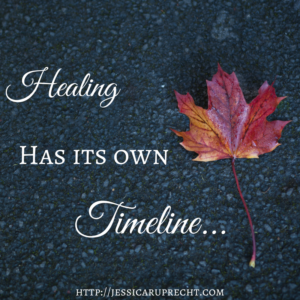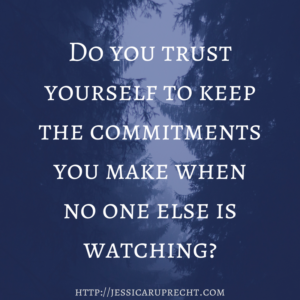 It has been many months since I have written. There are so many reasons for my long silence that it seems foolish to try and catalog them all. Some of them are health-related: my health reached a new low late last summer which was good in some ways and bad in others. On the good side, I got some useful diagnosis and treatments. On the downside, it has been nearly a year and I’m still not really well.
It has been many months since I have written. There are so many reasons for my long silence that it seems foolish to try and catalog them all. Some of them are health-related: my health reached a new low late last summer which was good in some ways and bad in others. On the good side, I got some useful diagnosis and treatments. On the downside, it has been nearly a year and I’m still not really well.
There are a lot of things about being ill that aren’t particularly glamorous. These days my list of non-negotiable self-care is long and my well-being deteriorates easily if I let things slip. But in general I’m actually doing okay. If the previous paragraphs made things seem a little bit dire, the truth is that it doesn’t really feel that way right now.
Which brings me to what I really want to talk about today: no matter how grim the circumstances are, there are some fundamentals which will always make being in those circumstances easier to bear — possibly the most important of which is our relationships to ourselves.
This is why I’ve also been radically reinventing my relationship with myself.
Because I truly believe our relationships with ourselves are fundamental to our happiness and well-being — and most of my life I’ve been in a really bad one.
I have been unkind.
I have been judgmental.
I have shamed and berated and bullied myself.
I have done all these things in the name of motivating myself to be better: to do more, to be braver, to earn other people’s approval.
But the truth is that none of these things have happened (except maybe the last one). If I have done more it has only been out of terror. My self-bullying has only ever made me more scared and never once made me braver. And whatever approval I might have earned from others has always been at the cost of my approval of myself.
And I know these things now, but that knowledge has been hard-won. Rewriting the rules of how I relate to myself has been the scariest and the best thing that I have ever done.
It’s a problem I’ve been working on for a while and I’ve written about it before (see here and here and here).
But I really don’t think it’s overstating things to claim that the quality of your relationship to yourself is the one thing that really matters. All the problems we worry about, all of the times we question our worthiness — it really comes down to this: if we learn to love ourselves enough, none of those things matter.
We learn that we can have problems and make mistakes and still be worthy of love and belonging — and it is this knowledge that makes all of it okay.
Self-compassion is strong enough to carry us through even our worst difficulties.
Self-forgiveness enables us to face our wrongs, make amends where we can, and live with the parts that can never be made right.
And these two things together allow us to find our courage in the face of our fear.
Because to dare is to take a risk and to risk is to be willing to fail. And in order to survive our failures and keep on trying we need compassion for our fear, forgiveness for our errors, and to love ourselves for being brave enough to have tried in the first place.
But what I’ve been learning more recently as my health has been improving and creating more energy for me to work with in my life — self-compassion, forgiveness, and love are essential, but there’s one last piece that I’d been missing: self-trust.
This is what I think it boils down to: Do you trust yourself to keep the commitments you make when no one else is watching?
I am terrible at this. I will kill myself trying to keep the commitments I make to other people — but the promises I make to myself I break thoughtlessly, as easily as breathing.
But I have underestimated the cost of breaking the promises I make to myself.
I underestimated the cost of not sitting down to write on all the days I wanted to, but didn’t.
I underestimated the cost of choosing what was easy over what was important.
I underestimated the cost of using my health as an excuse to avoid the things that mattered — when the truth was that I avoided those things because they scared me.
That cost was my trust in myself.
My trust that I would make what mattered to me a priority, that I wouldn’t let other people’s needs or preferences walk all over mine, that I would show up for the activities and events that really mattered to me even if doing that was terrifying. My trust that I would be on my side even when no one else was.
So I’ve entered a new phase of my self-relationship rehabilitation program.
Over the past few years I’ve become really good at what I now have come to see as “phase one” of rehabilitating my relationship with myself: I have become really good at noticing what is true for me, offering myself compassion in the face of difficulty, and forgiving myself my humanity, my mistakes, and my imperfections.
I believe that these skills are the essential foundation without which trust can never be built.
And now in phase two I’m building that trust — I’m learning to keep my promises to myself.
To not shelve the projects that I care the most about just because they also scare me.
To not put off the activities that really matter unless the reasons are truly beyond my control.
To show up for my dreams and my passions, even if that means I show up imperfectly.
Today I showed up for myself by showing up for my writing. By taking myself out of my apartment and sitting down at the library to write this blog post (because I knew if I stayed home, I wouldn’t).
I made the commitment and I kept it even though yesterday that meant going to the library in the rain, and today it meant going in boiling heat.
I kept the promise even though my to-do list for this weekend is already a mile long and the floors in our apartment haven’t been cleaned in roughly a thousand years and I feel bad about that.
But I showed up anyways. Because right now my writing is the next-most-important thing after the non-negotiable self-care that keeps my life running. Because keeping my commitment to my writing is keeping my commitment to myself, and that matters to me more than anything.
It matters because how I feel about myself improves every time I keep a commitment, and deteriorates every time I had the opportunity to keep a commitment and didn’t.
And I really do believe that how we feel about ourselves is everything.
I shan’t promise that this commitment to my writing means that I will be showing up on the blog here more often — my real priority right now is working on my memoir which I have finally returned to after literal years of neglect (and which I am determined to finally finish). But my hope is to be here more often, for whatever that might be worth.
I hope that all is well with each of you.
Much love,
Jessica
P.S. For a deeper dive on what trust really is, and how to cultivate it (with others and yourself), I highly recommend Brene Brown’s SuperSoul Sessions talk, The Anatomy of Trust.
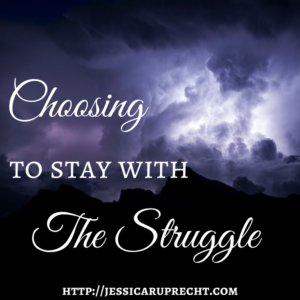 Here’s an often unwelcome, but ultimately unavoidable truth: sometimes life is just hard.
Here’s an often unwelcome, but ultimately unavoidable truth: sometimes life is just hard.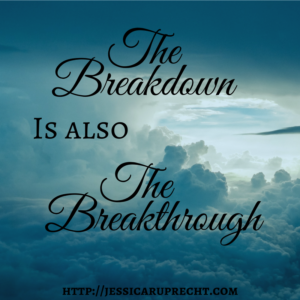 Years ago at a college party someone remarked to me that drunk people walk like this: fine, fine, fine, fine — oh sh*t, falling. Parties were really never my scene, but that image stuck with me and I remember it to this day because it seemed like a really good metaphor.
Years ago at a college party someone remarked to me that drunk people walk like this: fine, fine, fine, fine — oh sh*t, falling. Parties were really never my scene, but that image stuck with me and I remember it to this day because it seemed like a really good metaphor.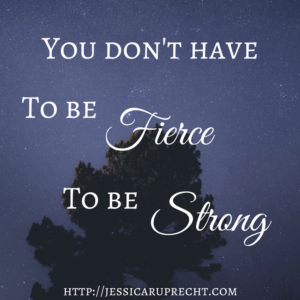 I’ve been thinking a lot about courage and strength the past few weeks. Like many of you, I’ve felt called to step outside of my comfort zone in new ways — in forms ranging from contacting my congressional representatives to beginning work on a new ebook.
I’ve been thinking a lot about courage and strength the past few weeks. Like many of you, I’ve felt called to step outside of my comfort zone in new ways — in forms ranging from contacting my congressional representatives to beginning work on a new ebook.